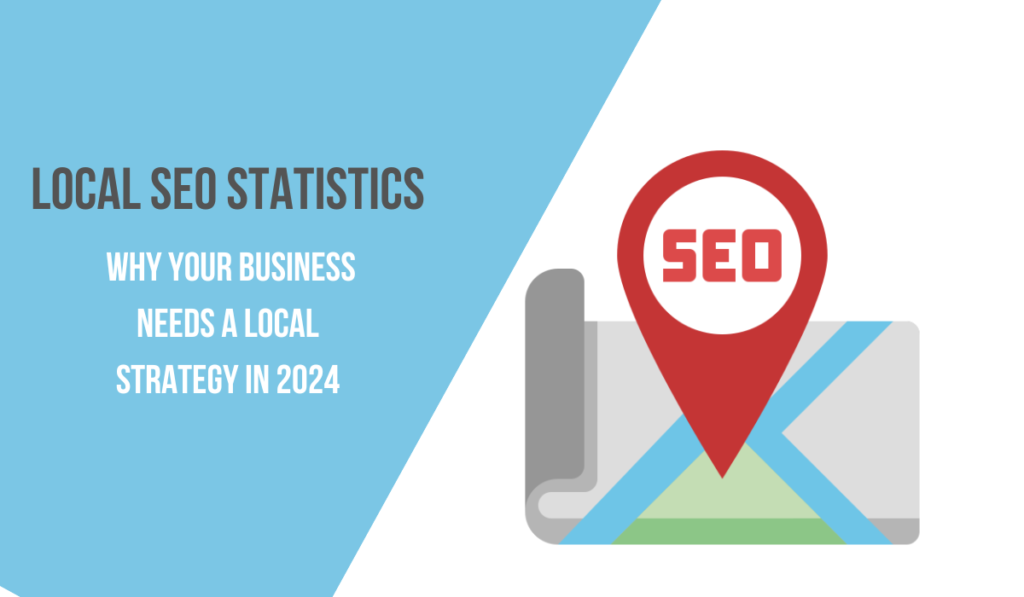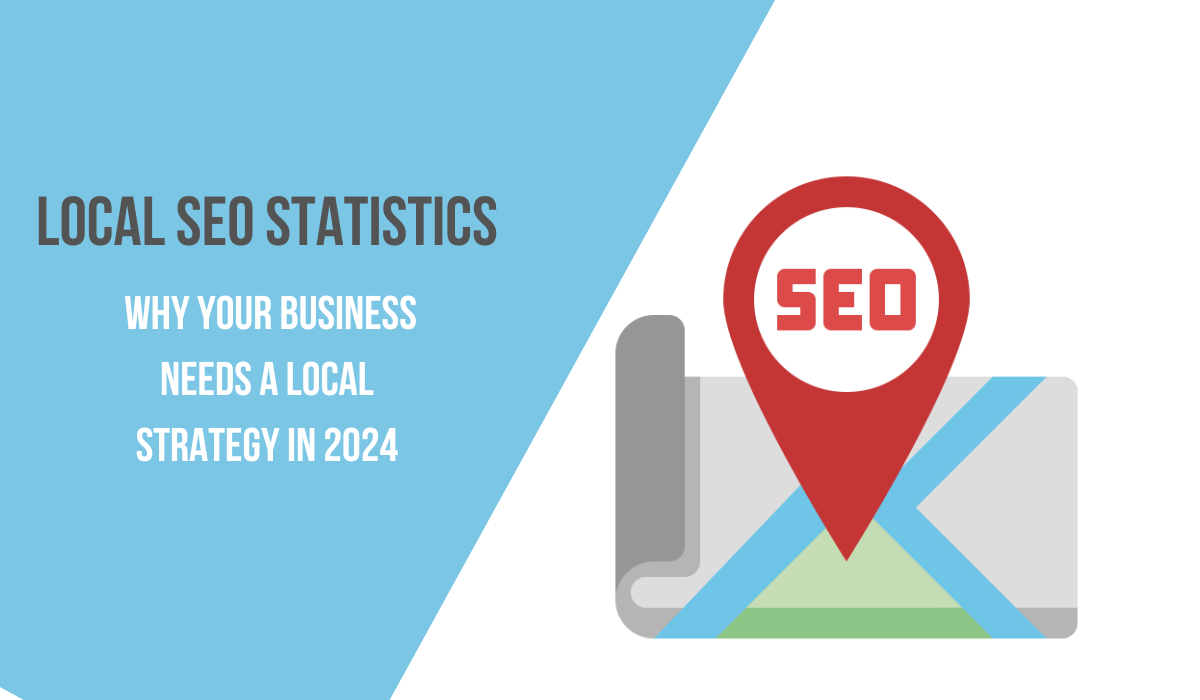
Businesses of all sizes, especially local ones, need a strong online presence in the digital age. Local SEO has become a crucial marketing approach for firms to boost their SERP presence for location-specific queries. Local SEO can boost your business since more people use search engines to find local businesses.
Look at the newest statistics and trends to comprehend local SEO’s value. These data points show how consumers connect with local companies online and the benefits of a good local SEO campaign. These information can help you allocate marketing efforts and focus on the best strategies for your organization.
This blog looks at 2024’s most intriguing local SEO statistics. These data will show why your business requires local SEO and how to maximize your online presence to attract local clients. Understand these data to stay ahead in a competitive digital marketplace as a small business owner or marketing professional.
Local Search Trends and Consumer Behavior
Recent mobile device proliferation and search engine complexity have changed how consumers find and interact with local businesses. To recruit and retain local customers, firms must understand these consumer behavior shifts. Local search trends and analytics can help businesses understand how consumers find, assess, and interact with local businesses online. This knowledge can help you tailor your local SEO approach to your target audience’s needs. The biggest local search trends and consumer behaviors affecting the digital landscape in 2024 are covered here.
- 97% of consumers find local companies online.
Most customers find local businesses via search engines, so organizations need a strong online presence.
- LocalIQ reports 46% of Google queries are local.
Your website and online listings should be optimized for local search since nearly half of Google searches are local.
- LocalIQ says 80% of local searches result in purchases.
Local searches convert well, with 4 out of 5 online, in-store, or phone sales.
- WebFX reports 88% of local mobile searches result in a store visit or call within 24 hours.
Local searches on mobile devices are urgent, with a large fraction resulting to same-day business contact.
- 76% of smartphone users browsing nearby businesses visit within a day.
Mobile optimization for local SEO is crucial since smartphone users searching locally are likely to visit a business within 24 hours.
- WebFX reports a 900% increase in “near me” searches in two years.
The use of “near me” in search inquiries has increased, showing that consumers are increasingly seeking local companies.
- 70 percent of people visit stores after reading online content.
Accurate and up-to-date internet listings are crucial because most shoppers base their store visits on online information.
- WebFX found that 61% of consumers prefer firms with a strong online and offline presence.
A consistent online and offline presence builds consumer trust and makes them more inclined to choose your business over competition.
- HubSpot reports that 72% of local searchers visit stores within 5 miles.
Local search relies on proximity, with roughly three-quarters of buyers visiting a store within five miles.
- HubSpot reports 30% of mobile searches are location-related.
Optimizing your website for mobile devices is crucial because many mobile searches are local.
- HubSpot reports 78% of local mobile searches lead to offline transactions.
Local mobile searches convert well, with over 75% resulting to in-store transactions.
Local search is increasingly important in consumer behavior and decision-making, as shown by these figures. Businesses must engage in local SEO methods to increase their visibility and make it simpler for potential customers to find them online as more people use search engines. Understanding these changes and customizing your marketing will help your firm succeed in a digital and location-driven market.
Key Local SEO Statistics
Some of the most convincing local SEO statistics show the value of improving your online presence for local search. These data demonstrate how local SEO may boost your business’s visibility, traffic, and income.
- WebFX says 28% of local searches lead to purchases.
Over 25% of local searches result in a purchase, demonstrating local SEO’s high conversion potential.
Because individuals search for nearby companies to buy, this data shows the significant commercial motive underlying local searches.
Optimizing your website for local search can reach this motivated demographic and boost sales.
- Moz says Google 3-pack ranks first in 93% of local searches.
Visibility depends on appearing in Google’s local pack, which tops local search results.
For local queries, the Google 3-pack, also known as the local pack or map pack, displays three local company listings at the top of search results.
Since people are more likely to interact with the top results, getting into the Google 3-pack can boost your business’s visibility and click-through rates.
- Google searches for local information account for 46%.
Optimizing for local search is crucial as nearly half of Google searches are local.
This data shows the huge potential of local SEO, as many searchers are looking for local businesses, products, and services.
Businesses can use local SEO to generate more quality leads and customers from this large source of focused traffic.
- SEO Tribunal reports 97% of users find local businesses online.
A solid online presence is crucial since most consumers find local companies via search engines.
This figure emphasizes the necessity of a well-optimized website and accurate business listings across internet directories and platforms.
By making your business easily discoverable online, you may increase your local search market share and consumer base.
- 88% of shoppers trust internet reviews as much as personal recommendations
Online reviews influence local search rankings by developing customer trust and trustworthiness.
Online reviews strongly influence consumer decisions and local business perceptions, as shown by this data.
Encourage satisfied customers to submit good reviews and manage your online reputation to boost local search rankings and attract new customers.
- LocalIQ reports 56% of retailers haven’t claimed their Google My Business listing.
Claiming and enhancing Google My Business is a missed opportunity for many local businesses.
Google My Business (formerly Google Business Profile) is a free tool that lets businesses manage their Google Search and Maps presence.
Claiming and enhancing your Google Business Profile may boost your local search exposure, customer information, and online reputation.
- Thinking with Google says that 92% of consumers will travel up to 20 minutes to reach a local business.
Local search optimization can assist businesses gain local customers, as most will travel short distances to visit a local business.
This statistic shows the importance of appropriately identifying your business’s location and service region in local SEO to attract local customers.
- Think with Google also shows that 18% of local queries result in same-day purchases.
Local SEO boosts sales immediately, since over 20% of local searches lead to a purchase within 24 hours.
This data highlights the value of a strong local internet presence, which can directly affect consumer behavior and provide rapid commercial returns.
- 78% of local mobile searches lead to offline retail transactions reports SEO Tribunal
A large percentage of mobile local searches result in in-store purchases, demonstrating the tight link between online and offline sales.
This data shows the necessity of mobile-optimizing your website and local listings as more consumers use smartphones to search and visit local businesses.
- The typical Google My Business listing gets 1,260 views per month.
A well-optimized Google Business Profile can get over 1,000 views each month from potential clients.
This data shows that a well-managed Google Business Profile can expose your business to many targeted, local searches.
These local SEO statistics show the necessity of investing in a thorough local SEO plan to boost your business’s online exposure, attract more local clients, and succeed in today’s digital landscape. You may capitalize on local search and stay ahead of your competition in a competitive market by optimizing your website, claiming and managing your company listings, and using online reviews.
The Future of Local SEO
Local SEO will remain essential to digital marketing as consumer behavior changes and search engines improve. We’ll cover local SEO’s future trends and projections in this section and how firms should adjust to stay ahead.
- Voice search will get popular.
Voice search will become more important in local search as smart speakers and virtual assistants become more popular.
BrightLocal found that 75% of smart speaker owners search locally weekly and 53% everyday.
Businesses must optimize their content and local listings for natural language searches and conversational keywords to be found in voice search as it grows.
- Google’s local algorithm will improve.
Google uses several signals and criteria to provide the most relevant and trustworthy local search results, which is continually developing.
Google may prioritize user interaction, social proof, and a business’s online quality and consistency in the future.
Businesses must focus on user experience, online reputation, and accurate and up-to-date information across all local platforms and directories to stay ahead of these developments.
- User-generated content will rise in importance.
Online reviews, photographs, and social media mentions will influence local search ranks and consumer decisions.
The quantity, velocity, and diversity of reviews are among the top factors affecting local search rankings, according to Moz.
Businesses that actively promote and manage user-generated content will gain confidence, local customers, and search visibility.
- Local content will be more important for SEO.
To attract and engage local audiences, businesses must invest in high-quality, locally-focused content since search engines value local relevance and context.
Local guides, blog articles, videos, and other tools can demonstrate a business’s knowledge and community involvement.
Businesses may boost local search rankings, attract more qualified traffic, and become trusted local authority by providing great, locally-relevant content.
- We won’t negotiate mobile optimization.
A mobile-friendly website and local listings are vital for local SEO success since most local searches are now done on mobile devices.
Google’s mobile-first indexing already favors mobile websites in search results, and this tendency is expected to grow.
Mobile-optimized competitors may steal market share from companies that don’t offer a seamless mobile experience.
- There will be a rise of zero click searches.
Local search is increasingly using “zero-click” searches, where users find information directly in search results without navigating through to a website.
Sparktoro found that 64.82% of Google searches in 2020 went unclicked, up from 50% in 2019.
Businesses must optimize their Google Business Profile and other local listings to deliver complete, engaging information that meets user intent immediately in search results to adapt to this trend.
Local SEO trends change, therefore firms who modify their techniques will succeed in the long run. In a competitive and dynamic local search landscape, businesses can succeed by prioritizing user experience, maintaining a strong online reputation, and generating quality, locally relevant content.
Conclusion
Local SEO is essential for firms seeking local customers in the digital age. This article’s data show that consumers increasingly use search engines to identify, assess, and engage with local companies, making a strong online presence and successful local SEO strategy crucial.
Local SEO is changing due to mobile optimization, user-generated content, voice search, and “zero-click” searches. Businesses who monitor these trends and adjust their strategy will be more prepared for local search challenges and possibilities.
Local SEO success depends on excellent user experiences, a strong online reputation, and meaningful, locally-relevant content. Businesses may increase visibility, attract more qualified leads, and expand by claiming and optimizing their Google Business Profile, managing online reviews, and assuring accurate and consistent content across all local platforms.
As we move ahead to local SEO, firms who prioritize these techniques and adapt to change will succeed. Businesses can build lasting client relationships and become market leaders by remaining aware of local consumers’ changing wants and preferences and updating their local search strategy.
In conclusion, the power of local SEO cannot be overstated. By leveraging the insights and best practices outlined in this article, businesses of all sizes and industries can harness the potential of local search to drive meaningful, sustainable growth and success in the years to come.

